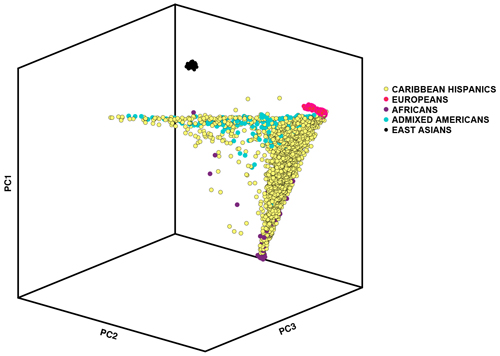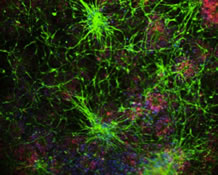Columbia University
Irving Medical Center
Neurological Institute
710 West 168th Street, 3rd floor
(212) 305-1818
Featured Research
In the Lab:
Giuseppe Tosto, MD, PhD
 Giuseppe Tosto, MD, PhD
Giuseppe Tosto, MD, PhDAs a trained neurologist and neuroscientist, with broad expertise in both the clinical aspects and genetic epidemiology of Alzheimer's disease (AD) and other neurodegenerative disorders, the focus of my research is centered on understanding the heterogeneity of Alzheimer's disease (AD) from a phenotypic and genetic viewpoint. In collaboration with Dr. Richard Mayeux and the Laboratory for Genetic Epidemiology, I am pursuing several substantive lines of research in community-based longitudinal studies and large families multiply affected by AD, including:
Genetics of Alzheimer's disease in Admixed Populations (View Relevant Publications)
The genetic profile of admixed populations has become a primary line of my research. We recently published the largest genome-wide association study in a sample of Caribbean Hispanics, which led to the identification of a novel locus associated with the AD, FBXL7. This finding was further validated by showing the gene’s overexpression in two independent human brain expression experiments and three transgenic mice models of AD. This highly relevant finding points to a new pathway that may be involved in the pathogenesis of the disease. This effort further resulted in a recent, NIH-funded project (in collaboration with Taub faculty member Ismael Santa-Maria Perez) that focuses on admixture mapping to identify genetic variants within ancestral blocks associated with the disease. Leveraging the large, multiethnic cohorts with genetic data available in our lab, I'm also looking at alternative genetic mechanisms responsible for the higher incidence and prevalence of AD in admixed populations, such as the effect of epistasis and polygenic risk scores.
Heterogeneity of Alzheimer's disease (View Relevant Publications)
Leveraging my clinical training in the field of neurodegenerative diseases, I am currently studying the clinical, genetic, and neuropathological correlates of AD subtypes, such as the motor variant of Alzheimer’s disease (characterized by extrapyramidal signs) and the rapidly progressive variant (characterized by an aggressive course). Such sub-classification of the disease has not only nosologic significance, but allows for better patient profiling, as AD subtypes have specific features and progression rates. Ultimately, careful investigation of the clinical and non-clinical features of AD subjects will permit successful application of precision medicine-driven diagnostic and therapeutic approaches, in future.
 Figure 1. Top three principal components (PC1/2/3) computed for the
Caribbean Hispanic sample (highlighted in yellow) along with the
1000G reference superpopulations (Magenta = Europeans;
Purple = African; Turquoise = American Admixed; Black = East
Asians).
Figure 1. Top three principal components (PC1/2/3) computed for the
Caribbean Hispanic sample (highlighted in yellow) along with the
1000G reference superpopulations (Magenta = Europeans;
Purple = African; Turquoise = American Admixed; Black = East
Asians).
The Association of Cardiovascular Risk Factors, Stroke, and Alzheimer's disease (View Relevant Publications)
Epidemiological evidence suggests an association between AD and vascular risk factors, such as hypertension, diabetes, atherosclerosis, and arterial fibrillation. Established tools for the prevention and control of vascular risk factors could help prevent the development of AD and other dementias, making this an extremely important area of research. In the context of the Washington Heights-Inwood Community Aging Project (WHICAP) grant, led by Dr. Richard Mayeux since 1989, I am currently conducting genetic and clinical studies, in collaboration with Dr. Adam Brickman, aiming to disentangle the complex interplay between cerebrovascular and neurodegenerative changes, both core features of AD.
Giuseppe Tosto, MD, PhD
Assistant Professor of Neurology (in the Taub Institute for Research on Alzheimer's Disease and the Aging Brain)
gt2260@cumc.columbia.edu

